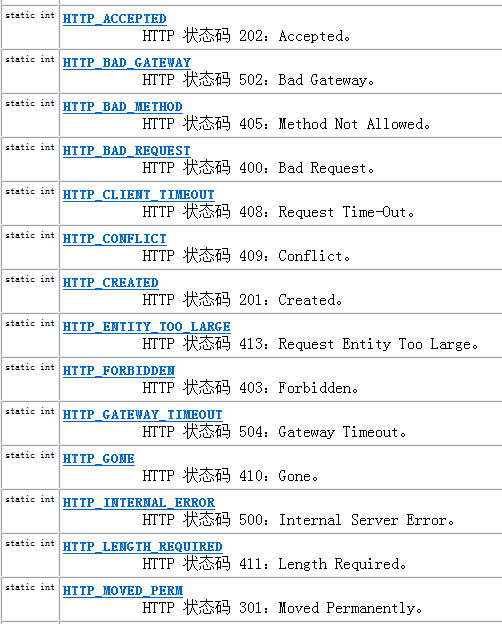Rumah >Java >javaTutorial >使用JAVA实现http通信详解
使用JAVA实现http通信详解
- 高洛峰asal
- 2017-01-05 14:26:032294semak imbas
Http通信概述
Http通信主要有两种方式POST方式和GET方式。前者通过Http消息实体发送数据给服务器,安全性高,数据传输大小没有限制,后者通过URL的查询字符串传递给服务器参数,以明文显示在浏览器地址栏,保密性差,最多传输2048个字符。但是GET请求并不是一无是处——GET请求大多用于查询(读取资源),效率高。POST请求用于注册、登录等安全性较高且向数据库中写入数据的操作。
除了POST和GET,http通信还有其他方式!请参见http请求的方法
编码前的准备
在进行编码之前,我们先创建一个Servlet,该Servlet接收客户端的参数(name和age),并响应客户端。
@WebServlet(urlPatterns={"/demo.do"})
public class DemoServlet extends HttpServlet {
private static final long serialVersionUID = 1L;
public void doGet(HttpServletRequest request, HttpServletResponse response)
throws ServletException, IOException {
request.setCharacterEncoding("utf-8");
response.setContentType("text/html;charset=utf-8");
String name = request.getParameter("name");
String age = request.getParameter("age");
PrintWriter pw = response.getWriter();
pw.print("您使用GET方式请求该Servlet。<br />" + "name = " + name + ",age = " + age);
pw.flush();
pw.close();
}
public void doPost(HttpServletRequest request, HttpServletResponse response)
throws ServletException, IOException {
request.setCharacterEncoding("utf-8");
response.setContentType("text/html;charset=utf-8");
String name = request.getParameter("name");
String age = request.getParameter("age");
PrintWriter pw = response.getWriter();
pw.print("您使用POST方式请求该Servlet。<br />" + "name = " + name + ",age = " + age);
pw.flush();
pw.close();
}
}使用JDK实现http通信
使用URLConnection实现GET请求
实例化一个java.net.URL对象;
通过URL对象的openConnection()方法得到一个java.net.URLConnection;
通过URLConnection对象的getInputStream()方法获得输入流;
读取输入流;
关闭资源。
public void get() throws Exception{
URL url = new URL("http://127.0.0.1/http/demo.do?name=Jack&age=10");
URLConnection urlConnection = url.openConnection(); // 打开连接
BufferedReader br = new BufferedReader(new InputStreamReader(urlConnection.getInputStream(),"utf-8")); // 获取输入流
String line = null;
StringBuilder sb = new StringBuilder();
while ((line = br.readLine()) != null) {
sb.append(line + "\n");
}
System.out.println(sb.toString());
}
使用HttpURLConnection实现POST请求
java.net.HttpURLConnection是java.net.URL的子类,提供了更多的关于http的操作(getXXX 和 setXXX方法)。该类中定义了一系列的HTTP状态码:

public void post() throws IOException{
URL url = new URL("http://127.0.0.1/http/demo.do");
HttpURLConnection httpURLConnection = (HttpURLConnection) url.openConnection();
httpURLConnection.setDoInput(true);
httpURLConnection.setDoOutput(true); // 设置该连接是可以输出的
httpURLConnection.setRequestMethod("POST"); // 设置请求方式
httpURLConnection.setRequestProperty("charset", "utf-8");
PrintWriter pw = new PrintWriter(new BufferedOutputStream(httpURLConnection.getOutputStream()));
pw.write("name=welcome"); // 向连接中输出数据(相当于发送数据给服务器)
pw.write("&age=14");
pw.flush();
pw.close();
BufferedReader br = new BufferedReader(new InputStreamReader(httpURLConnection.getInputStream(),"utf-8"));
String line = null;
StringBuilder sb = new StringBuilder();
while ((line = br.readLine()) != null) { // 读取数据
sb.append(line + "\n");
}
System.out.println(sb.toString());
}
使用httpclient进行http通信
httpclient大大简化了JDK中http通信的实现。
maven依赖:
<dependency> <groupId>org.apache.httpcomponents</groupId> <artifactId>httpclient</artifactId> <version>4.3.6</version> </dependency>
GET请求
public void httpclientGet() throws Exception{
// 创建HttpClient对象
HttpClient client = HttpClients.createDefault();
// 创建GET请求(在构造器中传入URL字符串即可)
HttpGet get = new HttpGet("http://127.0.0.1/http/demo.do?name=admin&age=40");
// 调用HttpClient对象的execute方法获得响应
HttpResponse response = client.execute(get);
// 调用HttpResponse对象的getEntity方法得到响应实体
HttpEntity httpEntity = response.getEntity();
// 使用EntityUtils工具类得到响应的字符串表示
String result = EntityUtils.toString(httpEntity,"utf-8");
System.out.println(result);
}

POST请求
public void httpclientPost() throws Exception{
// 创建HttpClient对象
HttpClient client = HttpClients.createDefault();
// 创建POST请求
HttpPost post = new HttpPost("http://127.0.0.1/http/demo.do");
// 创建一个List容器,用于存放基本键值对(基本键值对即:参数名-参数值)
List<BasicNameValuePair> parameters = new ArrayList<>();
parameters.add(new BasicNameValuePair("name", "张三"));
parameters.add(new BasicNameValuePair("age", "25"));
// 向POST请求中添加消息实体
post.setEntity(new UrlEncodedFormEntity(parameters, "utf-8"));
// 得到响应并转化成字符串
HttpResponse response = client.execute(post);
HttpEntity httpEntity = response.getEntity();
String result = EntityUtils.toString(httpEntity,"utf-8");
System.out.println(result);
}

HttpClient是Apache Jakarta Common下的子项目,用来提供高效的、最新的、功能丰富的支持HTTP协议的客户端编程工具包,并且它支持HTTP协议最新的版本和建议。HttpClient已经应用在很多的项目中,比如Apache Jakarta上很著名的另外两个开源项目Cactus和HTMLUnit都使用了HttpClient。
更多使用JAVA实现http通信详解相关文章请关注PHP中文网!

